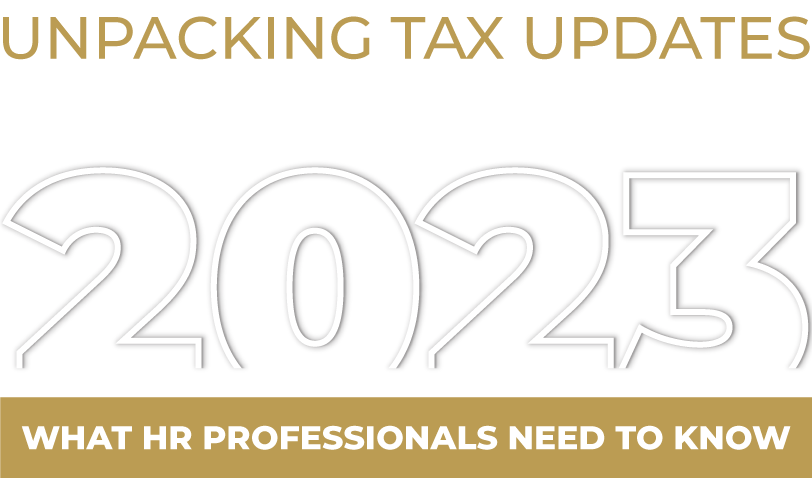

14 March 2023
10:00 – 11:30 SA Time
On your PC via Zoom
Free
Welcome from Aubrey Masango & Dr Jerry Gule (IPM)
JOIN US for a first-of-its-kind webinar co-hosted by IPM and Tax Consulting SA, as we unpack tax updates post-budget speech 2023, specifically for HR & Remuneration professionals.
This webinar is exclusively designed for HR & Remuneration professionals and the content tailored to your needs and interests.
The event aims to provide a unique opportunity to gain valuable knowledge and insights on tax updates post-budget speech 2023 with a focused and targeted learning experience that is relevant to your profession.

Jerry Botha – Managing Partner at Tax Consulting SA
Jerry has over 20 years’ experience in the field of taxation, holds his own FSB License, is a Master Reward Practitioner and serves on the Executive Board of the South African Reward Association (“SARA”), Chairs the SARA Employee Benefit Committee, and is a Certified Payroll Practitioner and Tax Practitioner.
He is the managing partner of South Africa’s largest independent tax practice, enjoys presenting and is passionate about tax and international individuals. He has also authored the Lexis Nexis “Expatriate Tax” textbook, as critically acclaimed by Judge Dennis Davis.
 Tanya Tosen – Tax and Remuneration Specialist at Tax Consulting SA
Tanya Tosen – Tax and Remuneration Specialist at Tax Consulting SA
Tanya Tosen’s experience spans over the mobility, HRIS, payroll, tax, and benefits spheres.
She holds a B-com Financial Accounting degree, a Computer Science diploma as well as an Advanced Certification in Tax from the University of Pretoria.
Tanya was also awarded her Master Mobility Specialist accreditation through SARA.
 Dr Jerry Gule – CEO Of The Institute of People Management (IPM)
Dr Jerry Gule – CEO Of The Institute of People Management (IPM)
Business Executive with academic background and vast experience in human resources management and development. The academic experience involves lecturing, training, conducting field research and writing reports.
Ability to lead and manage professional teams covering the different spectrum of human capital management and consulting services. Well experienced in managing the goods and services supply value chain within a large commercial enterprise.
Well-developed skills for managing meetings at Board and Committees level. A Lead Independent Non-Executive Director with well-developed insights into effective organizational development and transformation processes to enable a company to have traction on such areas as employment equity, diversity and intercultural dynamics management, leadership and management development, performance management as well as business coaching and mentoring programmes.
 Aubrey Masango – Broadcast Journalist
Aubrey Masango – Broadcast Journalist
A passionate, sincere and inspirational broadcaster, writer, columnist and a speaker, with a love for South Africans in all their diversity.
He constantly looks for conversations aimed at unlocking the humanity and potential of each individual and collective in realising their goals. Aubrey was born in Mamelodi, east of Pretoria and was educated at St John’s College in Johannesburg.
After a short stint at University, he went straight into business, rising quickly through the ranks of all the organisations he worked for, culminating in a seven-year directorship on the board of a national records management company.
Tuesday, 14 March 2023
10:00 – 11:30
On your PC via Zoom
Free
Session 1 | 1 February 2023 | REGISTRATION CLOSED
Date: Wednesday 1 February 2023
Time: 18:00 (SA Time)
Platform: On your PC via Zoom
Attendance Fee: Free
Session 2 | 17 February 2023 | REGISTRATION OPEN
Date: Friday, 17 February 2023
Time: 18:00 (SA Time)
Platform: On your PC via Zoom
Attendance Fee: Free
Controlled Foreign Companies –
South African Tax Considerations
Controlled Foreign Companies – South African Tax Considerations
South Africa’s tax system includes a Controlled Foreign Company (CFC) regime designed to address the taxation of income earned by foreign companies owned by South African tax residents.
Where a South African tax resident holds or controls a foreign company, they may be subject to income tax in South Africa on the CFC’s foreign income, even if that income has not yet been distributed. This is an anti-avoidance measure to prevent South African tax residents from utilising foreign companies in the avoidance of South African tax.
What is a Controlled Foreign Company?
A CFC is broadly defined in section 9D of the Income Tax Act, No. 58 of 1962, as any foreign company where more than 50% of the total participation rights or voting rights are directly or indirectly held or exercisable by one or more South African tax residents.
Where this threshold is met, and unless a specific exemption applies, the net income of the CFC must be included in the income of the South African resident(s) in proportion to their participation rights, and taxed accordingly.
Taxpayers who fail to accurately account for a CFC’s income risk audit or reassessment by SARS, especially in light of increased global transparency and data sharing through mechanisms such as the Common Reporting Standard.
Key Features of the CFC Regime
Place of Effective Management and Corporate Tax Residency in South Africa
South Africa follows a residence-based system of taxation, meaning that resident companies are subject to tax on their worldwide income.
In terms of section 1 of the Income Tax Act, No. 58 of 1962 (the Act), a company is regarded as a South African tax resident if it is either:
unless a double tax agreement (DTA) provides otherwise.
The concept of POEM is central to determining a company’s tax residency, particularly where cross-border structures are involved. It affects both foreign companies with South African involvement and South African-incorporated entities that may be managed from abroad.
What is Place of Effective Management?
Although not defined in the Act, POEM has been interpreted through South African case law, SARS guidance, and international commentary, particularly the OECD Model Tax Convention and Commentary thereto.
Broadly, POEM refers to the location where key management and commercial decisions necessary for the conduct of the entity’s overall business are made, in substance and not merely in form.
The determination of POEM is a factual enquiry, and is not limited to formalities such as the registered office, place of incorporation, or location of board meetings. Instead, it focuses on:
Application in Cross-Border Contexts
POEM plays a critical role in determining corporate tax residency in both inbound and outbound scenarios:
Both scenarios must be carefully evaluated in light of South African domestic law and any applicable DTA.
Interaction with Double Tax Agreements
Where a company is regarded as resident in both South Africa and another jurisdiction, the relevant DTA will typically contain a tie-breaker clause to resolve the conflict.
Most of South Africa’s DTAs allocate tax residency to the country where the company’s POEM is located. However, some newer treaties apply a Mutual Agreement Procedure (MAP), requiring the tax authorities of both states to determine residence based on additional factors.
Correct DTA application is essential to avoid dual residency exposure and to obtain treaty relief on dividends, interest, royalties, and other income.
Practical Implications for Companies
Incorrect or dual tax residency status can expose a company to:
Permanent Establishment – Tax Exposure in Cross-Border Contexts
As businesses expand across borders, one of the key tax risks they face is the inadvertent creation of a permanent establishment (PE) in a foreign jurisdiction. A PE may trigger foreign income tax exposure for a company even in the absence of incorporation or tax residency in that jurisdiction.
South African companies with offshore activities, or foreign companies with South African operations, must be aware of the PE concept, how it arises, and how it interacts with applicable Double Tax Agreements (DTAs).
What Is a Permanent Establishment?
A PE is generally defined in a DTA as a fixed place of business through which the business of an enterprise is wholly or partly carried on. Common examples include:
South Africa’s DTAs typically follow the OECD Model Tax Convention, and many incorporate updated provisions from the Multilateral Instrument (MLI), which narrows common avoidance strategies and expands the scope of PE risk.
Inbound vs Outbound Permanent Establishment Risk
Even short-term or project-based activities can give rise to PE risks if not carefully managed and monitored.
Consequences of a Permanent Establishment Finding
If a PE is found to exist:
Non-compliance can result in penalties, double taxation, and reputational harm.
In a connected world, even limited physical or digital presence in a foreign country can create tax exposure. Managing PE risk is essential for international tax compliance and operational efficiency.
Controlled Foreign Companies –
South African Tax Considerations
South Africa’s tax system includes a Controlled Foreign Company (CFC) regime designed to address the taxation of income earned by foreign companies owned by South African tax residents.
Where a South African tax resident holds or controls a foreign company, they may be subject to income tax in South Africa on the CFC’s foreign income, even if that income has not yet been distributed. This is an anti-avoidance measure to prevent South African tax residents from utilising foreign companies in the avoidance of South African tax.
What is a Controlled Foreign Company?
A CFC is broadly defined in section 9D of the Income Tax Act, No. 58 of 1962, as any foreign company where more than 50% of the total participation rights or voting rights are directly or indirectly held or exercisable by one or more South African tax residents.
Where this threshold is met, and unless a specific exemption applies, the net income of the CFC must be included in the income of the South African resident(s) in proportion to their participation rights, and taxed accordingly.
Taxpayers who fail to accurately account for a CFC’s income risk audit or reassessment by SARS, especially in light of increased global transparency and data sharing through mechanisms such as the Common Reporting Standard.
Key Features of the CFC Regime
